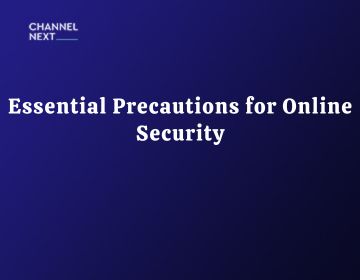The Critical Need for Effective Cyber Incident Response
Cyber threats are an ever-present danger, with the potential to disrupt operations, compromise sensitive data, and damage reputation. Despite proactive cybersecurity measures, organizations must prepare for the inevitability of cyber incidents and establish robust incident response strategies.
Channel Next is a reputable provider of cyber incident response services in Dubai. As a trusted partner, they specialize in assisting organizations to swiftly and effectively manage and mitigate cyber incidents
What is Cyber Incident Response?
Cyber incident response encompasses a series of coordinated actions taken to detect, contain, eradicate, and recover from cybersecurity incidents. Whether it’s a data breach, ransomware attack, or network intrusion, an effective incident response plan is essential for minimizing the impact of cyber threats and restoring normal operations promptly.
key components of a cyber incident response strategy
1. Detection and Identification
The first step in incident response is the timely detection and identification of cybersecurity incidents. This involves monitoring networks, systems, and endpoints for signs of suspicious activity or security breaches. Intrusion detection systems, security information and event management (SIEM) solutions, and endpoint detection and response (EDR) tools play a crucial role in identifying potential threats and alerting security teams to act.
2. Containment and Mitigation
Once a cybersecurity incident is detected, the next priority is to contain the threat and prevent further damage or unauthorized access. This may involve isolating affected systems, blocking malicious network traffic, and implementing temporary security controls to mitigate the impact of the incident. Rapid containment measures help limit the scope of the incident and prevent it from spreading across the organization’s infrastructure.
3. Investigation and Analysis
Following containment, security teams conduct a thorough investigation to determine the root cause of the incident, assess the extent of the damage, and gather evidence for remediation and legal purposes. Forensic analysis tools and techniques are employed to analyze system logs, network traffic, and malware artifacts, providing insights into the tactics, techniques, and procedures (TTPs) of threat actors.
4. Remediation and Recovery
With the incident analyzed, organizations can begin the process of remediation and recovery to restore affected systems and data to a secure state. This may involve applying security patches, restoring data from backups, and implementing additional security controls to prevent similar incidents in the future. A comprehensive recovery plan ensures minimal disruption to business operations and mitigates the risk of recurring incidents.
5. Post-Incident Review and Lessons Learned
After the incident has been resolved, it’s essential to conduct a post-incident review to evaluate the effectiveness of the response efforts and identify areas for improvement. Lessons learned from the incident are documented and incorporated into future incident response planning and training initiatives, strengthening the organization’s resilience against future cyber threats.
Channel Next: Your Trusted Partner in Cyber Incident Response
In the face of evolving cyber threats, organizations require strategic partnerships and innovative solutions to effectively respond to cyber incidents. Channel Next stands as your trusted partner in cyber security services in Dubai, offering a comprehensive suite of cyber incident response services in Dubai tailored to the unique needs of businesses.
With a dedicated team of cybersecurity experts and industry-leading technologies, Channel Next provides end-to-end support throughout the incident response lifecycle. From proactive threat detection and rapid incident response to post-incident analysis and remediation, Channel Next empowers organizations to mitigate the impact of cyber threats and maintain business continuity in the face of adversity.




















